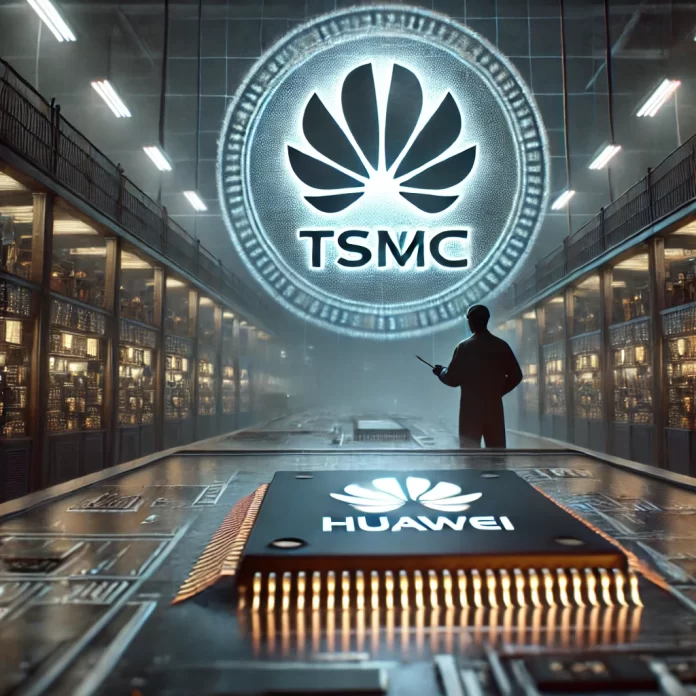Taiwan Semiconductor Manufacturing Co. (TSMC) recently made a significant discovery that has caused concern for both Taiwan and the United States.
TSMC Finds Its Chip in Huawei Device
The company, known as the world’s largest contract chipmaker, halted shipments to a customer after uncovering that one of its chips had been used in a product made by Chinese telecommunications giant Huawei. This raised alarms because it could potentially violate strict U.S. export regulations aimed at preventing China from gaining access to advanced technology.
TSMC is now in the process of investigating this incident, having suspended shipments about two weeks ago. The discovery came after reports that a Huawei device contained a TSMC-made chip, sparking concerns that U.S. sanctions had been breached. TSMC, as a key supplier to technology companies worldwide, has faced growing pressure to ensure it complies with export controls, particularly those imposed by the United States, which have increasingly targeted Chinese companies like Huawei in recent years.
Governments Notified of Potential Sanctions Violation
This situation has attracted the attention of both Taiwanese and U.S. government officials. After TSMC’s internal investigation, the company quickly informed the respective governments of Taiwan and the United States about the possible violation. The governments are now closely monitoring the case to determine whether there was a breach of U.S. export regulations. According to reports, the notification to the authorities took place on or before October 11th.
TSMC’s Shocking Breach of US Sanctions Puts Apple Chips at Risk
The governments are treating this as an “important warning event,” signaling the seriousness of the potential breach. If it is confirmed that U.S. export regulations were violated, this could lead to stricter enforcement of existing sanctions and even more stringent rules being placed on companies that do business with Huawei or other Chinese firms. At this stage, TSMC has not disclosed which of its customers had received the shipments in question, but it is clear that the fallout could be widespread.
The U.S. has imposed several sanctions on Chinese companies in recent years, with Huawei being one of the primary targets. These sanctions are part of a broader effort to limit China’s access to advanced semiconductor technology, which the U.S. believes could be used to enhance China’s military capabilities. Companies like TSMC, which manufacture cutting-edge chips, are under intense scrutiny to ensure they comply with these sanctions.
Taiwan Cracks Down on Chinese Corporate Espionage: 135 Investigators Raid 30 Locations
China’s Attempts to Evade U.S. Sanctions
Over the past few years, the United States has implemented increasingly strict export controls on advanced semiconductors, AI processors, and other technologies to prevent China from developing advanced military equipment. Huawei, one of China’s largest tech companies, has been at the center of these restrictions. The U.S. government believes that Huawei’s products could be used for surveillance and military purposes, leading to the company’s blacklisting.
Despite these sanctions, there have been multiple reports of Chinese companies attempting to find ways around the restrictions. Earlier this year, it was revealed that Chinese firms had been using cloud services from companies like Amazon to gain access to advanced U.S. processors and artificial intelligence capabilities. The discovery of a TSMC chip in a Huawei product adds to concerns for Taiwan that China may be finding ways to acquire restricted technology.
The current situation has drawn renewed attention to the broader issue of how Chinese companies may be circumventing international sanctions. While the U.S. government continues to tighten export controls, Chinese organizations have been accused of using creative means to access advanced technologies that are essential to their strategic goals. These attempts include indirect methods such as using cloud computing services, which allow Chinese firms to bypass some of the hardware restrictions imposed by the U.S.
Taiwan, as a close ally of the U.S. and a major player in the global semiconductor industry, has taken steps to ensure that it is not unwittingly aiding China in acquiring restricted technology. The Taiwanese government has implemented its own set of export control measures to complement the U.S. sanctions. These measures are designed to prevent Taiwanese companies from selling sensitive technology to Chinese firms that are on the U.S. blacklist, including Huawei.
The discovery of a TSMC chip in a Huawei device has raised questions about the effectiveness of these export controls. It is possible that the chip in question was shipped to a third party before making its way into the Huawei product, suggesting that additional safeguards may be needed to prevent such scenarios from happening in the future.
Outcome of the Investigation
As of now, TSMC has not made any public statements regarding the results of its investigation. The company’s silence has left many wondering about the next steps. However, it is clear that the investigation will have significant implications for the semiconductor industry and global trade relations. If it is found that U.S. export controls were indeed violated, this could lead to further tightening of restrictions on technology exports to China, and possibly even new sanctions being imposed on companies that are found to have violated the rules.
For now, both the U.S. and Taiwanese governments are closely watching the situation. TSMC’s role as a critical supplier of advanced chips means that any potential violation of export controls could have far-reaching consequences, not just for the company itself but for the entire semiconductor supply chain. Companies that rely on TSMC for their chip needs may also face increased scrutiny to ensure they are not inadvertently aiding Chinese firms in circumventing sanctions.
The discovery of the TSMC chip in a Huawei product is a stark reminder of the complexities involved in enforcing export controls in today’s interconnected world. With technology flowing across borders through multiple channels, ensuring compliance with sanctions requires constant vigilance. TSMC’s actions in suspending shipments and notifying governments of the potential violation show that the company is taking the issue seriously, but it also underscores the challenges that lie ahead in preventing sensitive technology from falling into the wrong hands.


